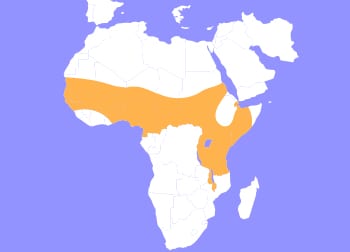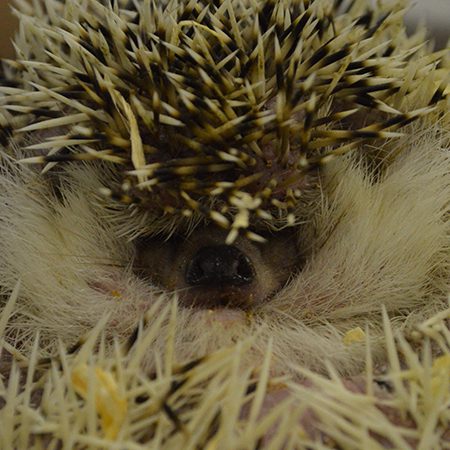African Pygmy Hedgehog
Atelerix albiventris
African pygmy hedgehogs are one of the most common species of domesticated hedgehog. These hedgehogs originate from Africa, primarily from areas surrounding Nigeria. They inhabit a variety of habitats, including grasslands, woodlands, bush, thickets, and plains. African pygmy hedgehogs are sometimes referred to as the four-toed, white-bellied, or domesticated hedgehog. These hedgehogs are the smallest member of the hedgehog family, weighing between 0.5 - 1.25 pounds.
One of the most prominent features of hedgehogs are the prickly spines covering their bodies. These small, non-barbed spines, are different from a porcupine’s. Hedgehog's spines are permanently embedded in the skin and are not shed. Hedgehogs have the ability to control and flex these spines and curl up into a ball through muscle contraction.
When provoked in the wild, the spines are used a defensive mechanism to evade predators. A hedgehog's spines are their first line of defense, they’ll roll up into a ball, and erect their spines against their predator to form a protective barrier. These animals are territorial in their natural habitat, and can engage in aggressive behavior if their territory is encroached upon. Hedgehogs are a very popular domestic pet in the United States, this first started in the 1980s. In the wild, these hedgehogs are insectivores, meaning that they mainly eat insects, however, this can change in domestication. African pygmy hedgehogs are accustomed to warm climates, which should be consistent in domestication. Wild hedgehogs have an average lifespan of 2 years, contrasting to domesticated hedgehogs living an average of 3 - 5 years.
Say Hello To Cub Creek's Hedgehogs: Butter, Fluff and Peanut
Peanut in the summer of 2019 and has been a joy to have ever since. We got him from a former camper so he came socialized and friendly. Fluff and Butter arrived at Cub Creek in the summer of 2021.

African Pygmy Hedgehog populations are spread throughout Western and Eastern Africa. They've been domesticated and since transported to the U.S. and Canada.
HABITAT -African pygmy hedgehogs inhabit grasslands, woodlands, bush, thickets, and plains of Africa.
DIET -In the wild they are insectivores. Domesticated hedgehog can eat specialized food, cat food, and insects.
FUN FACT -The name for a baby hedgehog is a hoglet.
SOCIAL BEHAVIOR -It can take awhile for a hedgehog to adjust to a human owner. Once they do they make great companions.
ACTIVITY -They are primarily nocturnal but can be crepuscular (active at dawn and dusk).
PREDATORS -Main predators in the wild are Verreaux’s eagle owl, jackal, hyena, and honey badgers.
SIZE -African pygmy hedgehogs can weigh between .5 - 1.25 pounds, getting as long as 6 inches.
RELATIVES - Genus Atelerix contains 3 other species of hedgehogs, all related to the African Pygmy Hedgehog.
CONSERVATION -African pygmy hedgehogs are considered Least Concern on the IUCN Red List.
Cub Creek Animal Care Information
Housing - We house our hedgehogs in a variety of enclosures, with large open petters and single living critter cages. The large open enclosures provide an abundant amount of room for hedgehogs to play at night, which includes hides and tunnels, which simulate their natural environment. Their enclosure is bedded with shavings. In the single living critter cages, they are multi-leveled, offering our hedgehogs a variety of space to explore. We make sure to keep them stimulated with plenty of toys.
Diet - We feed our hedgehogs a mixture of Spike’s Delite Hedgehog food (a specialized diet food for hedgehogs) and other dry food. Spike's Delite, provides multiple protein sources to help keep them healthy and happy! Their food includes chicken meal, fish meal, dried egg, and lots of vitamins and minerals. They will also receive mealworm treats from time to time to supplement their diet.
Enrichment - Being nocturnal, our hedgehogs love to play at night time. During the summer, campers may do a night owl to go see these cute creatures playing in the evening! We provide plenty of toys and enrichment for our hedgehogs, ranging from exercise wheels and exercise balls, to small plastic balls! A favorite of our campers and hedgehogs are toilet paper roll tubes!

